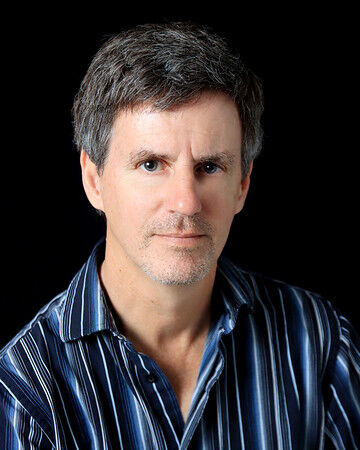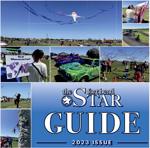Take a good look at that photo of me above. Believe it or not, I was not always the paragon of studly manliness you see depicted (and no, with all deference to a recent movie, I'm not "just" Ken). In my middle and high-school years, in fact, the term many would have applied to me was "geek." (Some still might, but we won't dignify those small-minded folks here.)
For a host of reasons that we don't need to delve into, those years were pretty rough for me, as they are for many adolescents. I wasn't one of the "cool" kids and I knew it. I wasn't antisocial, exactly, in the sense that I yearned to be more popular, but I didn't quite have the knack. There was always one part of the high-school day that I particularly dreaded: that half-hour or so between when my bus arrived at school and when the bell rang for the first class. All of the cool kids were in the halls, making small talk, comparing each other's clothes, doing all the stuff I was no good at.
Thankfully, I had a refuge: the library. Along with a few fellow geeks, er, bibliophiles, I would spend that time reading the newspaper or newsweeklies and science magazines. I could escape into a world of words and ideas before I had to deal with all that messiness to come.
I had been a voracious reader from the beginning of my schooling. My reading choices often went along with my various nerdy pop-culture interests: Tarzan, Planet of the Apes, DC (and later, Marvel) comics, Sherlock Holmes, science fiction, etc. Sometime in middle school, I became a fan of the television show "M*A*S*H". Nerd that I was, I wasn't content just to enjoy the show. I went to the school library to read the encyclopedia entries for the Korean War and U.S. Army rank structure, just so I could be a better-informed viewer. During my freshman year in high school, I bought the original novel, written by a real-life Army surgeon who modeled the character "Hawkeye" after himself. Like the 1970 movie version, the novel is much racier than the relatively tame network TV version.
Classic adventures and mystery stories were always a keen interest of mine, and books I remember checking out from the school library include "The Three Musketeers," "The Strange Case of Dr. Jekyll and Mr. Hyde," and the like. After watching the movie "Excalibur," I checked out "La Morte d'Arthur" and found it both challenging and rewarding (spoiler alert: it includes a lot of sex and violence). After a late-movie television showing of "The Great Escape," I read the book. Nautical stories always held a fascination for me (hence my later enlistment in the U.S. Navy), and I read "Mutiny on the Bounty" and its two lesser-known sequels. I was also a fan of Cold War spy stories, including a few of Ian Fleming's very racy and violent James Bond novels, and even checked out Soviet dissident Aleksandr Solzhenitsyn's massive tome "The Gulag Archipelago," although I must admit I didn't get very far into it.
My love for libraries and bookstores has never left me. When I was younger, many relatives, strangely believing that I was "hard" to shop for, often bought me gift certificates at the mall bookstore for the holidays and my birthday, and I made good use of them. Near the end of my third and final deployment in the Navy, my grandfather died. When the message from my family came through, my shipmates knew just where to locate me: the ship's library, where I spent many of my off-duty hours while underway. As I write this, I possess three valid library cards from different systems.
Right about now you're probably asking why I'm telling you all of this. As you're no doubt away, libraries, both school libraries and those for the general public, have been in the news lately. They have become the front lines in the latest skirmish of the years-long culture wars that we've been seeing for so long, and that I daresay many of us are eager to see wane.
Of course, libraries and books generally have always proven fertile ground for these kinds of battles. One other place I did find a home at high school was on the staff of the school newspaper. In one edition, I wrote a story about book bans in school libraries. Even then, they were old hat. Journalistically speaking, the story wasn't my finest effort, but I did do a fair bit of research and even interviewed one of our school librarians. Many of the titles she mentioned remain among the usual suspects in efforts to ban books from school libraries today.
About 15 years ago, I wrote for the Beaumont Enterprise, a few counties away from Fort Bend. My main beat was the courts, but one day, my editors assigned me a story from the education beat. Beaumont ISD had recently earned the distinction from the American Civil Liberties Union of Texas of having instituted one of the most egregious examples of school book bans in the state. The book: "Friday Night Lights," H.G. "Buzz" Bissinger's universally acclaimed journalistic account of a Texas Panhandle high school football team's exploits on the field and how those reverberated in the wider community. The book later was adapted into a well-regarded film and a long-running and perhaps even more lauded network television series.
In my reporting, the reasons for the ban were never made quite clear. According to district officials, one parent had complained about the book after their child brought it home from school. But the specific reasons for the original complaint were never identified. It turned out that there were only two copies on the library shelves of the entire district. The administration decided to remove those copies, although teachers could still assign it in class, under the assumption that students could read it with adult guidance.
I wasn't able to interview Bissinger for the story, although I tried very hard to. I placed a call to his publicist, but my editors wanted the story fast (they were afraid we would be scooped by another outlet), and I worked around it, using some of his quotes from the ACLU of Texas report (properly attributed, of course). Bissinnger, winner of a Pulitzer Prize, did call me the next day, and we had a great conversation, but too late for my story, a fact that annoys me to this day. Even he was uncertain about the reasoning, although he seemed to believe it might be because of allusions in the book to teenage sex. Others have objected to the book (the objections continue to this day) because of its realistic use of profanity and its depiction of the racism that was prevalent in the community he covered for about a year. (As a side note, I did meet Bissinger at a book-signing event in Houston a few years later, and reminded him of our interview. He's quite an interesting guy.)
Thus far, Fort Bend schools have seemed to avoid many of the culture war battles that have raged in recent years, including discussions of banning books wholesale from libraries. But we live in the times we live in, and anything could happen. Of course, there should always be room for discussion about what kinds of reading materials are appropriate for young and impressionable minds. The key is for those discussions to be thoughtful, reasoned, measured. A book, any book, should be considered as a whole for its intent, its literary merit, its value to the audience it is trying to reach.
I don't make this statement lightly: at various times in my personal history, reading books has in some sense saved my life. My love for reading, for the opportunities it offers to provide glimpses into other worlds, other realities, other ways of being, has seen me through more difficulties than I can name. Like me, young readers today find the books that speak to them, maybe even the books they need for their own particular circumstances. And like me, they'll find them whatever way they can. Any adults who think otherwise are fooling themselves.
If you'd like to discuss this with me, I'm available. When I'm not slaving over my laptop, it's a good bet you can find me at the library.
Fountain checks in at KFountain@fortbendstar.com
EDITOR'S NOTE: This article originally misstated the organization that named Beaumont ISD's removal of "Friday Night Lights" as egregious. The Fort Bend Star regrets the error.










(0) comments
Welcome to the discussion.
Log In
Keep it Clean. Please avoid obscene, vulgar, lewd, racist or sexually-oriented language.
PLEASE TURN OFF YOUR CAPS LOCK.
Don't Threaten. Threats of harming another person will not be tolerated.
Be Truthful. Don't knowingly lie about anyone or anything.
Be Nice. No racism, sexism or any sort of -ism that is degrading to another person.
Be Proactive. Use the 'Report' link on each comment to let us know of abusive posts.
Share with Us. We'd love to hear eyewitness accounts, the history behind an article.